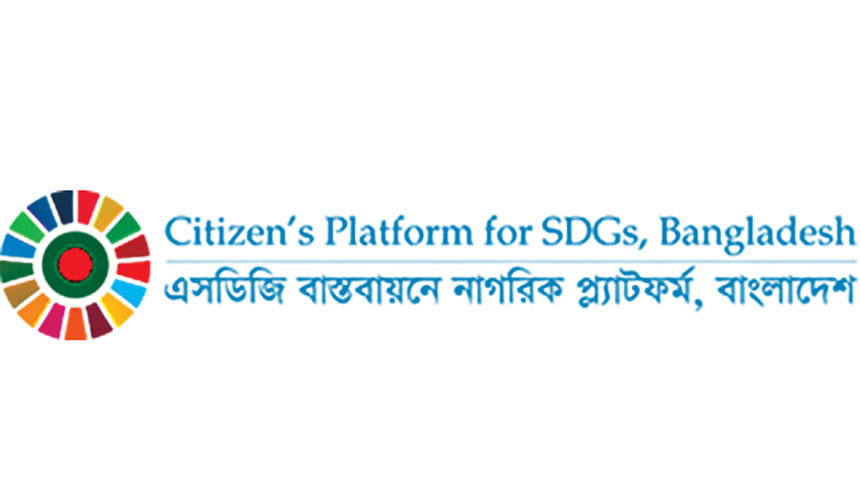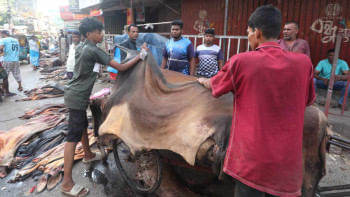Budget should leave no one behind Citizen’s Platform for SDGs says

Implementation of the proposed budget for fiscal 2020-21 requires a detailed work plan alongside a periodic reporting system with a focus on the concept of "Leaving No One Behind", said the Citizen's Platform for SDGs, Bangladesh yesterday.
It suggested using the SDG framework for designing the recovery strategy for the Covid-19 pandemic by embedding national priority indicators and articulating and linking the new challenges to SDG delivery in framing the Eighth Five-Year Plan.
The platform, which comprises more than 100 non-state actors and their networks and associates, also proposed increasing availability, accessibility and usability of disaggregated data and setting up a social accountability system, driven by non-state actors, to ensure delivery to Leaving No One Behind.
The suggestions came under a new initiative of the platform titled "Strengthening Citizen's Engagement in Delivering SDGs in view of Covid-19 Pandemic". They were presented at a webinar styled "New Challenges to SDG Delivery in BD and Budget21" yesterday.
Prof Mustafizur Rahman, a distinguished fellow at the Centre for Policy Dialogue (CPD), suggested raising the tax-GDP ratio to 14 per cent, avoiding loan traps induced by deficit financing, and joining initiatives for debt cancellation and global compacts for the private sector to attain the SDGs by 2030.
Mushtaque Chowdhury, vice-chairperson of Brac, spoke of the need for healthcare reforms, including increasing investment in healthcare from 1 per cent of GDP to 2.5 per cent and establishing a permanent health commission.
He also called for separating purchaser and provider to ensure accountability in procurements and good governance at the management level, and to tackle weaknesses in research and data.
Asif Ibrahim, an entrepreneur and a member of the platform's core group, suggested simplifying the process to avail government support in the form of working capital, initiating public-private partnerships to ensure housing and healthcare for workers and waiving VAT collection for a year.
Rasheda K Choudhury, executive director of the Campaign for Popular Education, stressed the need for allocations in education research and protecting gains made with regard to malnutrition and child labour.
Dr Iftekharuzzaman, executive director of the Transparency International Bangladesh, said the budget awarded corruption, encouraged inequality and went against the constitution, laws of the land and the SDGs all the while whistle-blowers were being harassed.
Shaheen Anam, executive director of the Manusher Jonno Foundation, said she found no budgetary measures on addressing the challenges such as domestic violence, increased work burden at home and child marriage faced by women now heightened by the pandemic.
Shamsul Alam, a member of the General Economics Division of the planning ministry, advocated for continuation of "soft lockdowns" and acknowledged the need for avenues other than banks for the financial inclusion of farmers.
Md Shahid Uz Zaman, executive director of the Eco Social Development Organization, said around 20 lakh people of plain land ethnic communities got no focus in the budget. Migrant workers in the north-western regions who were made redundant also necessitated attention.
Smallholder tea cultivators of Thakurgaon and Panchagarh are suffering from a drop in price of tea leaves from Tk 40 to Tk 14 a kilogram for a syndicate, he said.
There are doubts over how sharecroppers would avail the government support announced for farmers through the credit market as the package was intertwined with land ownership, he added.
Ashrafun Nahar Misti, executive director of Women with Disabilities Development Foundation, said the Bangladesh Bureau of Statistics needed to focus on generating data on whether the 18 lakh challenged persons were getting the government's allowance.
Just 1.96 per cent of the social safety net allocation was for the challenged, whose capacity for productivity again failed to get due recognition, she said.
Hassan Ali, president of the Ageing Support Forum, said the elderly, who constituted 8 per cent of the population, were not accommodated in the health budget.

 For all latest news, follow The Daily Star's Google News channel.
For all latest news, follow The Daily Star's Google News channel. 



Comments